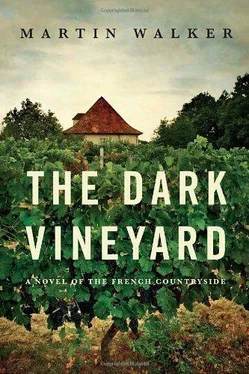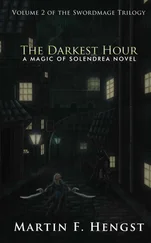Martin Walker - The dark vineyard
Здесь есть возможность читать онлайн «Martin Walker - The dark vineyard» весь текст электронной книги совершенно бесплатно (целиком полную версию без сокращений). В некоторых случаях можно слушать аудио, скачать через торрент в формате fb2 и присутствует краткое содержание. Жанр: Полицейский детектив, на английском языке. Описание произведения, (предисловие) а так же отзывы посетителей доступны на портале библиотеки ЛибКат.
- Название:The dark vineyard
- Автор:
- Жанр:
- Год:неизвестен
- ISBN:нет данных
- Рейтинг книги:5 / 5. Голосов: 1
-
Избранное:Добавить в избранное
- Отзывы:
-
Ваша оценка:
- 100
- 1
- 2
- 3
- 4
- 5
The dark vineyard: краткое содержание, описание и аннотация
Предлагаем к чтению аннотацию, описание, краткое содержание или предисловие (зависит от того, что написал сам автор книги «The dark vineyard»). Если вы не нашли необходимую информацию о книге — напишите в комментариях, мы постараемся отыскать её.
The dark vineyard — читать онлайн бесплатно полную книгу (весь текст) целиком
Ниже представлен текст книги, разбитый по страницам. Система сохранения места последней прочитанной страницы, позволяет с удобством читать онлайн бесплатно книгу «The dark vineyard», без необходимости каждый раз заново искать на чём Вы остановились. Поставьте закладку, и сможете в любой момент перейти на страницу, на которой закончили чтение.
Интервал:
Закладка:
“Quite a handsome man.”
“A tough one, too. He kept the family business going all through Prohibition, when alcohol was banned, and then again through the Depression. He had two sons. The younger one now runs one of the world’s biggest wine firms, after inheriting it from his father, and the older one was left nothing in the will that he claimed was a forgery.”
“Here’s another clipping-‘Disinherited Bondino Son Dies in Car Crash; Foul Play Not Suspected.’ Somebody didn’t agree with that verdict,” said Pamela. “The clipping is attached to a bill from a lawyer and another from a private detective for inquiries into the car crash. The lawyer’s bill is for thirty-two hundred dollars, but I imagine that was worth quite a sum back in 1958. And here’s the detective’s report. The last page says, ‘We regret to inform you that our inquiries have proved inconclusive.’”
“The dead man’s widow brought a lawsuit claiming her husband had been murdered. It got nowhere and she ran out of money,” Bruno said. “I was reading up about this earlier. But look at this photo-it’s the same baby girl, in nineteen fifty-seven, but this time with a woman, and on the back it says, Maman et Grand-mere. And if you look at this family photo of everybody including old Silvio, from Christmas 1956, the woman listed as Grand-mere is being embraced by Grand-pere. But look at Grand-pere’s face and compare it with this photo. It’s the same man, so Jacqueline’s grand-pere was the elder brother, the one who should have inherited but for the disputed will. You can confirm that from that photo of him in your news clipping. ‘Grand-mere’ was his widow, the woman who brought the failed lawsuit. See if you can find any names for Grand-mere and Maman.”
“Right here on the private detective’s bill-Mrs. Maria Bondino, 4249 Sunset Drive, Sausalito, California. What very long roads the Americans have. She must be Grand-mere. Look, here’s a carbon copy of a letter from Maria to Francis, dated April 4, 1958-that’s after the court verdict-asking for money ‘to ensure the education of’ his niece Sophia. So that’s the baby girl in the photo, who presumably grew up to marry a French-Canadian called Duplessis and to become Jacqueline’s mother.”
“That makes Jacqueline the great-niece of our Francis X. Bondino,” said Bruno, “the man whose wise old face beams at us from all these company brochures. And his son would be Jacqueline’s cousin, as well as her lover.”
“Her lover?” said Pamela, startled. “You didn’t tell me that. Was that while she was seeing Max or before?”
“Maybe while she was seeing Max; I’m not sure. But I think she deliberately set out to meet young Bondino. She knew exactly who he was and what he was doing in Saint-Denis. She knew that she was sleeping with her own cousin and she knew all about the family feud. But I don’t think Fernando had the slightest idea who she was or that they were related. The two branches of the family seem to have been bitterly estranged.”
“That makes it sound rather sinister.”
“Indeed it does,” said Bruno. “What’s in that next file?”
“More press clippings, new ones, all about the Bondino company, printed out from the Internet. Here’s one from BusinessWeek in March of this year about production problems in Australia because of the drought. And here’s an interview with Bondino from a wine magazine in May, with a paragraph marked in the margin. It’s about ‘exploring new opportunities in Europe, where the industry has yet to benefit from consolidation.’ He mentions France and Italy and eastern Europe. And here’s another bit she’s marked, about there being an ‘unsustainable business model in the Bordeaux region with too many small producers making too many wines of variable quality and no consistency of product.’ It says here that Fernando Bondino graduated from Stanford business school.”
“So she knew back in May that Bondino was coming to Europe,” mused Bruno aloud. “And Hubert got her letter asking to come and work for him at the end of May. She came to Saint-Denis on purpose, knowing that Bondino would also be here. But what did she have in mind?”
“This file looks interesting,” said Pamela, who had been perusing it while listening. “It’s about the history of wine making in the Dordogne and Vezere valleys by some professor at a university in California. It says he has the Bondino chair of wine studies, and she underlined the concluding paragraph that says, ‘History therefore suggests that the Dordogne and Vezere valleys represent the last unexploited opportunities for quality wine production in Europe, with excellent climate and terrain, reliable water supplies and inexpensive land prices.’ So Bondino decided to come here to Saint-Denis just after his own professor delivered this paper. It’s dated in April of this year.”
Bruno looked out when he heard the crunching of gravel in the courtyard as J-J braked his car. The detective opened the door but remained in the driver’s seat, his phone to his ear, nodding as Bruno waved a greeting and gestured for J-J to join them inside.
41
J-J burst through the door of Jacqueline’s house, beaming with pleasure. “We’ve got him. I was right all along. DNA evidence. Those hairs under Max’s nails. They definitely came from Bondino.”
“But those hairs could have come from the fight at the bar earlier that evening,” Bruno said.
“Don’t you remember? He said Max never laid a hand on him. It’s on tape from the interrogation. He says he punched Max in the nose but Max never laid a finger on him in the fight. So how can he explain away his own hair?”
“I don’t know,” said Bruno. “But the reason I called you here is that this Canadian girl is a lot more than she seems. Look at these family photos and these files-she’s Bondino’s cousin, and she knows it but he doesn’t. And it looks like she’s been stalking him. Pamela can explain it all; I’m going to look around because Jacqueline could be back within the hour.”
Bruno found the garbage can in the kitchen. It was empty, but there was a large wicker basket beside the fire that seemed full of old newspapers. He fished among the first few, using his pen to sort through them, but they just seemed to be discarded copies of Sud Ouest . He stood up, but one of the papers came with him, somehow stuck to his pen. He tried to shake it off, without success. He looked, and there were two strips of adhesive tape sticking his pen to the newsprint. Trying to peel them away he found five more small strips of the tape, each about a couple of inches long, all stuck to the paper.
“Why would Jacqueline have these strips of adhesive tape?” Bruno murmured, thinking aloud.
“Gift-wrapping,” Pamela said as she arrived in the kitchen. “That’s how I do it. If I’m wrapping a present, I cut off several strips of tape at a time so they’re ready when I fold the paper.”
“There’s no sign of wrapping paper,” said Bruno. “She may already have dumped stuff in the main garbage can outside. Pamela, can you have a look while I finish checking something upstairs?”
Leaving J-J looking at the files, Bruno went upstairs to find two bedrooms and a small bathroom filled with the usual feminine toiletries-soaps, shampoos, toothpaste and a hairbrush. He took a careful look but saw only the girl’s own long blond hairs. Jacqueline used one of the bedrooms to sleep in, the other as a dressing room, with her clothes and shoes in the cupboard. One item caught Bruno’s eye, an old Saint-Denis rugby shirt hanging forlornly from a nail. It must have belonged to Max. The chest of drawers was empty. The other room had a flimsy nightgown on the bed and a robe hanging on a hook on the back of the door. A small dressing table stood by the window, stacked with cosmetics. He looked in the drawers, which contained underwear and stockings. But then he saw something else, tucked away at the back, and pulled out a tightly rolled plastic bag that contained a spare hairbrush. He looked at it carefully.
Читать дальшеИнтервал:
Закладка:
Похожие книги на «The dark vineyard»
Представляем Вашему вниманию похожие книги на «The dark vineyard» списком для выбора. Мы отобрали схожую по названию и смыслу литературу в надежде предоставить читателям больше вариантов отыскать новые, интересные, ещё непрочитанные произведения.
Обсуждение, отзывы о книге «The dark vineyard» и просто собственные мнения читателей. Оставьте ваши комментарии, напишите, что Вы думаете о произведении, его смысле или главных героях. Укажите что конкретно понравилось, а что нет, и почему Вы так считаете.












